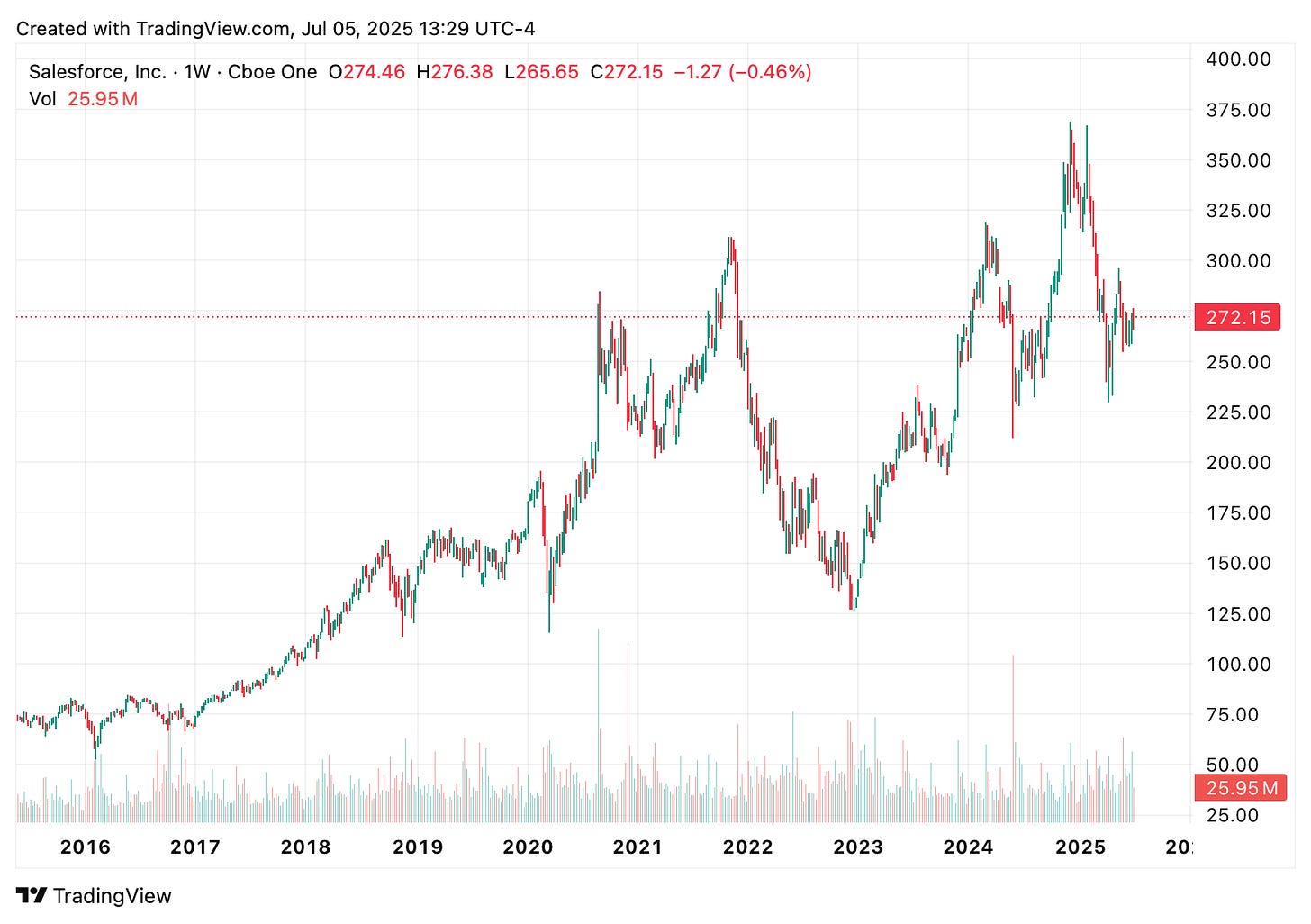Salesforce: a top stock for the AI agent revolution
The digital labour market could be worth over $10 trillion
Over the last few years, artificial intelligence (AI) technology has been adopted at an incredible rate. Thanks to generative AI apps like ChatGPT and Gemini, people all over the world are leveraging the power of the technology today.
We’re still very much in the early stages of the AI revolution, however. In the years ahead, we are likely to see use cases increase dramatically.
One application I’m excited about from an investment perspective is ‘AI agents’ – sophisticated software systems that can operate autonomously to perform complex tasks (for both businesses and individuals). I believe the market for AI agents is going to be enormous.
To capitalise on this trend, I’ve been building a position in Salesforce (NYSE:CRM) this year. In my view, it’s well positioned to be a major player in the agentic AI revolution.

From CRM software to agentic AI solutions
Founded in 1999, Salesforce has built its reputation as a leading customer relationship management (CRM) software company. Today, it stands as a global CRM powerhouse, providing software to over 150,000 customers and generating more than $35 billion in annual revenue.
Recently though, the company has been shifting its focus to agentic AI technology with the aim of revolutionising customer service and sales for businesses. Its offering here is called ‘Agentforce’ and it's akin to a digital labour platform.
Agentforce AI agents have the ability to initiate and complete sequences of tasks, handle conversations with customers, and provide relevant answers to customers from business data. This means that companies can potentially use them to engage with customers and prospects 24 hours a day, increasing productivity significantly.
Note that these agents can be used across a range of industries including retail, financial services, and healthcare. So, the market for them is substantial.
“Our goal is to be the #1 provider of digital labour in the world.”
Salesforce CEO Marc Benioff
8,000 AI customers already
Now, it’s still early days here as Agentforce was only launched in October 2024. However, the company appears to be having success with its agentic AI offering. Already, it has signed up around 8,000 customers. Of these, around 4,000 are paying for the service.
An example of a company using Agentforce is airline Finnair – it’s currently having ‘thousands of conversations’ per week with its customers using the technology. With Agentforce, it’s aiming to automate 80% of customer service queries and reduce new rep onboarding time by 25%.
Another company that is driving efficiency gains with Agentforce is restaurant booking platform OpenTable. Just three weeks after employing the software, it was handling nearly 75% of all restaurant web queries with the technology (a 50% improvement over its previous automation tool).
Other companies using Agentforce to improve efficiency include PepsiCo, Singapore Airlines, Pfizer, Gucci, and Indeed. According to Salesforce CEO Marc Benioff, customers are experiencing unprecedented levels of productivity, efficiency, and cost savings.
The Salesforce competitive advantage
Of course, there are many companies developing agentic AI solutions today. I believe that Salesforce has some major competitive advantages, however.
One is that its software is already embedded in over 150,000 companies worldwide. This means that it doesn’t have to start from scratch when selling AI solutions to businesses.
Another is that Agentforce is integrated with Salesforce’s apps and data services (Data Cloud and Tableau Next). This is really important – without access to data, AI agents are pretty much useless.
Note that the company refers to this integrated framework as ‘ADAM’ (apps, data, agents, metadata). It sees this framework as the key to delivering a complete agentic AI experience for businesses.
“No company is better positioned than Salesforce to lead customers through the digital labour revolution. With our deeply unified platform, seamlessly integrating our Customer 360 apps, Data Cloud and Agentforce, we’re already delivering unprecedented levels of productivity, efficiency and cost savings for thousands of companies.”
Salesforce CEO Marc Benioff
It’s worth pointing out that today, agentic AI is still a small part of the business. Last quarter, Data Cloud and AI annual recurring revenue (ARR) was only around $1 billion, versus Q1 revenue of $9.8 billion.
However, the long-term potential here is substantial. According to Benioff, the market for digital labour could be worth anywhere between $3 trillion and $12 trillion, so the software company could have a long growth runway ahead of it.
Growth at a reasonable price
Zooming in on the financials and valuation, analysts expect Salesforce to generate earnings per share of $11.30 for the financial year ending 31 January 2026. That puts the stock on a forward-looking price-to-earnings (P/E) ratio of about 24 at today’s share price.
I see quite a bit of value at that earnings multiple. This is a company that is a leader in its industry (with a consistent track record in terms of top-line growth), founder-led, profitable (with a rising ROCE), paying dividends, doing buybacks, and has considerable long-term growth potential.
Of course, competition from rivals is a risk. One competitor I’ll be monitoring closely is ServiceNow, whose digital workflow software is also embedded in thousands of companies worldwide.
I like the risk-reward set-up at current levels, however. Taking a long-term view, I’m excited about the potential here.
Edward Sheldon owns shares in Salesforce. The information in this article is for general informational purposes only and should not be considered financial advice. Please consult a qualified financial professional before making any investment decisions.




